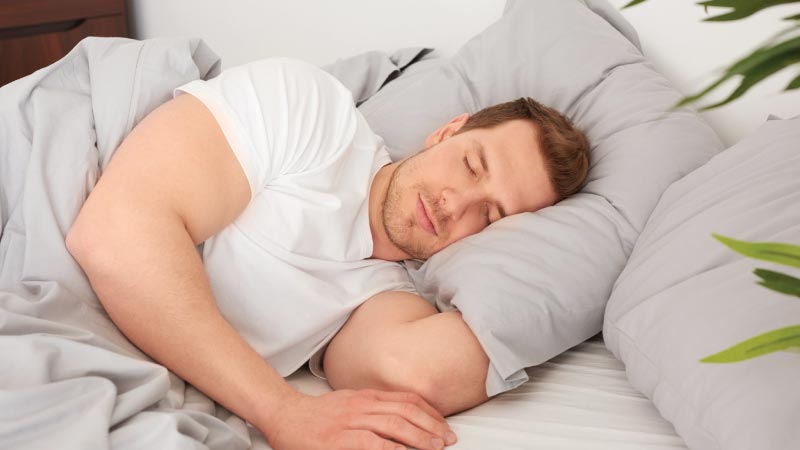Experts Answer Most Common Sleep Queries!

Welcome to our journey into the world of sleep! In this series, we'll address common questions about sleep health. Whether you're curious about how your sleep position affects your well-being or how to optimize daytime naps, we're here to provide clarity and actionable tips. Join us as we explore the science behind better sleep and empower you to achieve restful nights and refreshed mornings. Let's dive in and uncover the secrets to improving your sleep quality!

1. Why do we spend one-third of our lives sleeping?
We spend about one-third of our lives sleeping because sleep is essential for various bodily functions. It helps in physical repair, mental rejuvenation, and maintaining overall health. During sleep, our body performs critical processes like memory consolidation, hormone regulation, and immune system strengthening.
2. How much sleep do I really need, and why does it vary from person to person?
The amount of sleep needed varies based on age, lifestyle, and individual health. On average, adults need 7-9 hours of sleep per night, while children and teenagers require more. Genetic factors, stress levels, and overall health also influence individual sleep needs.
3. What happens to my brain when I don't get enough sleep?
Lack of sleep impairs cognitive functions such as attention, alertness, concentration, reasoning, and problem-solving. It can also lead to mood swings, anxiety, and depression. Chronic sleep deprivation affects brain plasticity, which is crucial for learning and memory.
4. Can improving my sleep quality help with weight loss?
Yes, improving sleep quality can aid in weight management. Poor sleep affects hormones like leptin and ghrelin, which regulate hunger and appetite. Insufficient sleep can increase cravings for high-calorie foods and reduce motivation for physical activity.
5. How does the blue light from screens affect my sleep, and what can I do about it?
Blue light from screens inhibits the production of melatonin, the hormone responsible for regulating sleep-wake cycles. To mitigate this effect, reduce screen time an hour before bed, use blue light filters on devices, or wear blue light-blocking glasses.
Does using screens before bedtime really mess up your sleep?
6. What are some signs that I might have a sleep disorder?
Common signs of sleep disorders include excessive daytime sleepiness, loud snoring, gasping or choking during sleep, difficulty falling or staying asleep, frequent awakenings, restless legs, and chronic fatigue. If you experience these symptoms, it’s advisable to consult a healthcare professional.
7. What is sleep hygiene, and what small changes can I make to improve it?
Sleep hygiene refers to habits and practices that promote good sleep quality. Small changes to improve sleep hygiene include maintaining a consistent sleep schedule, creating a relaxing bedtime routine, keeping your sleep environment cool and dark, avoiding caffeine and heavy meals before bed, and limiting screen time before sleep.
8. How do stress and anxiety affect my sleep, and what strategies can I use to combat them?
Stress and anxiety activate the body's stress response, making it difficult to relax and fall asleep. To combat this, practice relaxation techniques such as deep breathing, meditation, or yoga. Establish a calming pre-sleep routine, and try to manage stress during the day through regular exercise, time management, and seeking support if needed.
9. Are there foods that can help me sleep better? Which ones should I include in my diet?
Yes, certain foods can promote better sleep. Foods rich in tryptophan, magnesium, and melatonin can help improve sleep quality. Examples include turkey, almonds, cherries, bananas, oats, and warm milk. Avoid caffeine, nicotine, and heavy, spicy meals close to bedtime.
Foods that disturb your sleep
10. Why do some people wake up feeling refreshed while others feel groggy, even after the same amount of sleep?
Feeling refreshed or groggy depends on sleep quality and sleep cycles. Waking up during a deep sleep phase can leave you feeling groggy, while waking up during a lighter sleep stage can make you feel more refreshed. Factors like sleep environment, stress levels, and overall health also impact how rested you feel upon waking.
11. What role do my mattress and pillow play in the quality of my sleep?
A good mattress and pillow are essential for sleep quality as they provide the necessary support and comfort. An uncomfortable or worn-out mattress can lead to poor sleep posture, resulting in aches and pains that disrupt sleep. Similarly, an appropriate pillow can support your neck and spine alignment, reducing the risk of waking up with neck or back pain.
12. How does my sleep position affect my health?
Your sleep position can significantly impact your health. For example, sleeping on your back can help prevent acid reflux and reduce wrinkles but may worsen snoring and sleep apnea. Side sleeping is generally considered the healthiest position as it can reduce snoring, improve digestion, and decrease the risk of sleep apnea. However, it can also cause shoulder and hip pain if not properly supported.
13. Can napping during the day affect my nighttime sleep?
Daytime napping can have both positive and negative effects on nighttime sleep. Short naps (20-30 minutes) can boost alertness and performance without interfering with nighttime sleep. However, longer or late-afternoon naps can disrupt your sleep cycle, making it harder to fall asleep at night.
14. How does physical activity impact my sleep?
Regular physical activity can improve sleep quality and duration. Exercise helps regulate your circadian rhythm and reduces symptoms of insomnia and sleep apnea. However, vigorous exercise close to bedtime may have the opposite effect by increasing energy levels and body temperature, making it harder to fall asleep.
15. What is the relationship between sleep and my immune system?
Sleep is crucial for a healthy immune system. During sleep, your body produces cytokines, which are proteins that help fight off infections, inflammation, and stress. Chronic sleep deprivation can weaken the immune system, making you more susceptible to illnesses such as colds, flu, and other infections.
Help your employees to get good sleep